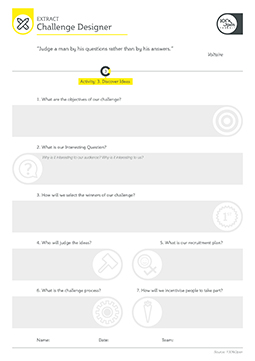Challenge Designer
“Judge a man by his questions rather than by his answers.”Voltaire


This tool is for designing the process and content for an open innovation challenge.

This tool helps plan our crowdsourcing challenge logically and in the right order from setting objectives to selecting winners. We use the tool as a central process and document for use by members of the whole team that will run the challenge and commercialise its outcome. Designing the challenge could take up to a month and can be efficiently accomplished using two workshops – the first to find out where there are gaps or disagreements and the second to finalise the challenge having allowed time in between for research.
If we communicate the objectives of our challenge clearly it is more likely to engage busy people. What sort of ideas or technologies are we looking for and why? How are we going to take the winning idea forwards?
Effective challenges start with an Interesting Question. This needs to be interesting both to the Crowd to ensure enthusiastic participation and to the Challenge Holder to ensure enthusiastic acceptance of the winning ideas. The Interesting Question needs to be jargon-free, compelling and 20 words or less. To write an Interesting Question we start with ‘How can you help us…’ Interesting questions should neither be too broad nor too narrow in scope.
Once we have a few candidate Interesting Questions it is important to test them out. Do people understand the question? Are they excited by it? Can they think of answers? If so, our question qualifies as ‘interesting’ to our audience.
Does our challenge qualify as a ‘burning platform’ that is urgent and important? Would answering it increase growth or avoid a serious market issue? Is it a question that we have failed to answer internally? If so our question probably qualifies as ‘interesting’ to our organisation.
We need to decide in advance how we will determine the best ideas or submissions. Voting is a key part of what makes crowdsourcing platforms work. Will we enable our community to vote a winner or select a short list for us to choose from? What technical or business selection criteria will we apply? (See PPP Filter for guidance).
Creating a formal judging panel of senior stakeholders builds organisational commitment to our challenge and will support later stages of the innovation process. The panel shares decision-making and provides a useful source of expertise to draw upon throughout the challenge. It is crucial the panel is interdisciplinary to drive the ultimate success of the challenge as such teams will often be responsible for delivering the innovations that result.
This is a key part of the process and much will depend on how successful we are at recruiting a knowledgeable but diverse crowd. We adapt the recruitment plan to recruit a representative audience based on the type of challenge. Those where we are targeting users/consumers (B2C) and those where we are targeting innovation partners in businesses (B2B).
Will we ask one Interesting Question or more? Do we want a short burst of insightful conversation or a longer idea generation and selection process? For longer challenges it is good practice to design a distinct series of phases. For example:
Insights -> Ideas -> Idea development ->Voting
Now we decide when the challenge will start and finish. We must include about a month for customisation and deployment of the platform and then up to a month to recruit and form a community and for people to learn how to use the technology.
Many crowdsourcing platforms are gamified in that they have a leaderboard – a league table of active or successful contributors. This is created by awarding points for activities such as submitting ideas, commenting or voting on the ideas of others. What prizes or contracts (See Open Business Models for alternatives) are we offering to the winners? We need to publish these and our criteria for selecting winners on the challenge website. Making the process transparent in this way motivates people to participate.
You must be logged in to download this tool
You must be logged in to download this worked example
2014 - 100%OPEN LTD